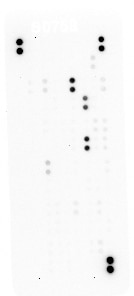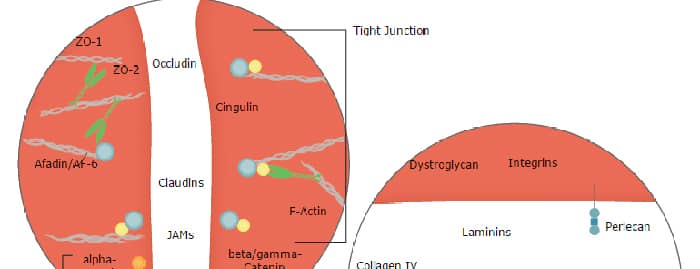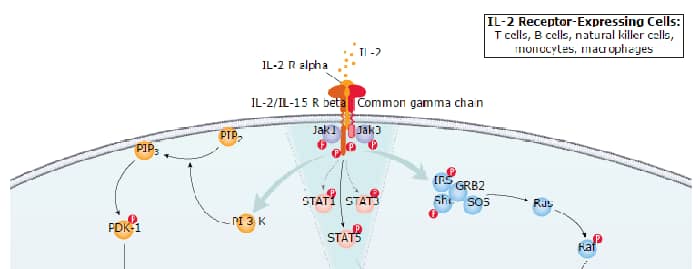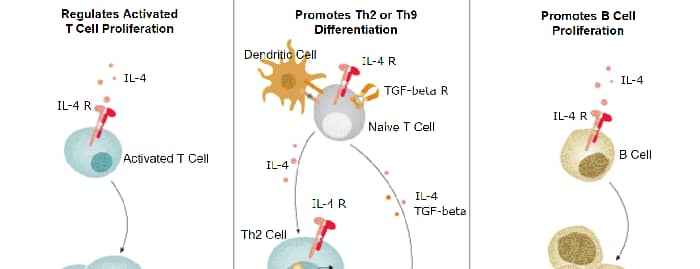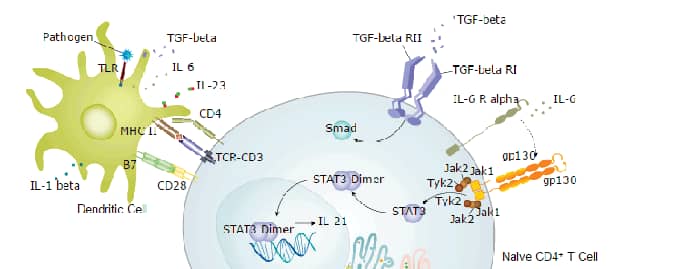Proteome Profiler Human XL Oncology Array
Proteome Profiler Human XL Oncology Array Summary
Kit Summary
To detect differences in 84 cancer-related proteins between samples. No specialized equipment is necessary.
- Troubleshooting Guide
- Compatible with LI-COR* and chemiluminescence detection
General Assay Principle
Carefully selected capture antibodies have been spotted in duplicate on nitrocellulose membranes. Cell culture supernates, cell lysates, tissue lysates, serum, plasma, urine, saliva, or human milk are diluted and incubated with the Human XL Oncology Array overnight. The array is washed to remove unbound proteins, followed by incubation with a cocktail of biotinylated detection antibodies. Streptavidin-HRP and chemiluminescent detection reagents are applied, and a signal is produced at each capture spot corresponding to the amount of protein bound. Chemiluminescence is detected in the same manner as a Western blot.
- 4 Array Membranes
- 4-Well Multi-dish
- Array Buffers
- Wash Buffer
- Detection Antibody Cocktail
- Streptavidin-HRP
- Chemiluminescent Detection Reagents
- Transparency Overlay Template
- Detailed Protocol
For a complete list of the kit contents and necessary materials, please see the Materials Provided/Other Supplies Required sections of the product datasheet.
Stability and Storage
Reagents are stable for 12 months from date of receipt when stored in the dark at 2° C to 8°.
| Simultaneously detect the levels of these cancer-related proteins in a single sample. | ||
| AFP | ErbB4 | MMP-2 |
| Amphiregulin | FGF basic | MMP-3 |
| Angiopoietin-1 | FoxC2 | MMP-9 |
| ANGPTL4 | FKHR | MSP/MST1 |
| ENPP-2/Autotaxin | Galectin-3 | MUC-1 |
| AXL | GM-CSF | Nectin-4 |
| BCL-X | HCG | Osteopontin |
| CA125/MUC-16 | HGF R/c-Met | p27/Kip1 |
| E-Cadherin | HIF-1alpha | p53 |
| VE-Cadherin | HNF-3beta | PDGF-AA |
| CAP-G | HO-1/HMOX1 | CD31/PECAM-1 |
| CA-9 | ICAM-1/CD54 | Progesterone R |
| Cathepsin B | CD25/IL-2 R alpha | Progranulin |
| Cathepsin D | IL-6 | Prolactin |
| Cathepsin S | CXCL8/IL-8 | Prostasin |
| CEACAM-5 | IL-18 Bpa | E-Selectin |
| Decorin | KLK-3/PSA | Maspin |
| DKK-1 | KLK-5 | PAI-1/Serpin E1 |
| DLL-1 | KLK-6 | SNAIL |
| EGF R/ErbB1 | Leptin (OB) | SPARC |
| Endoglin/CD105 | Lumican | Survivin |
| Endostatin | CCL2/MCP-1 | Tenascin-C |
| Enolase 2 | CCL8/MCP-2 | THBS-1 |
| eNOS | CCL7/MCP-3 | TIE-2 |
| EpCAM | M-CSF | UPA-1 |
| ER-alpha | Mesothelin | VCAM-1 |
| ErbB2 | CCL3/MIP-1alpha | VEGF |
| ErbB3 | CCL20/MIP-3alpha | Vimentin |
Specifications
Product Datasheets
Assay Procedure
Refer to the product datasheet for complete product details.
Briefly, relative expression levels of human cancer-related proteins in samples can be determined using the following procedure:
- Prepare membrane and incubate with prepared sample
- Incubate the membrane with Detection Antibody Cocktail
- Incubate the membrane array with Streptavidin-HRP
- Develop the membrane array with Chemi Reagents 1 and 2
- Expose the membrane array to autoradiography film
View Printable Protocol
Kit Contents
- Rectangular 4-Well Multi-dish
- 4 Human XL Oncology Array nitrocellulose membranes spotted with 84 different antibodies to cancer-related proteins
- Array Buffer 4
- Array Buffer 6
- Chemi Reagent 1
- Chemi Reagent 2
- Detection Antibody Cocktail, Human XL Oncology Array
- Streptavidin-HRP
- Transparency Overlay Template
- Wash Buffer Concentrate (25X)
Other Supplies Required
Reagents
- Pipettes and pipette tips
- Gloves
- Plastic container with the capacity to hold 50 mL (for washing the arrays)
- Plastic transparent sheet protector (trimmed to 10 cm x 12 cm and open on three sides)
- Plastic wrap
- Absorbent lab wipes (KimWipes® or equivalent)
- Paper towels
- X-ray film (Kodak BioMax™ Light-1) or equivalent
- Flat-tipped tweezers
Equipment
- Rocking platform shaker
- Microcentrifuge
- Autoradiography cassette
- Film developer
- Flatbed scanner with transparency adapter capable of transmission mode
- Computer capable of running image analysis software and Microsoft Excel
Other Supplies Required for Cell Lysate Samples
- Phosphate-Buffered Saline (PBS)
- Lysis buffer 17
- Aprotinin
- Leupeptin (Catalog # EI002)
- Pepstatin (Catalog # EI003)
Other Supplies Required for Tissue Lysate Samples
- Protease Inhibitor Cocktail
- Igepal® CA-630
- Sodium deoxycholate
- Sodium dodecyl sulfate
R&D Systems Protocol for Multiple Analyte Detection Using the Proteome Profiler™ Human XL Oncology Array Kit, Panel A (Catalog # ARY026)
- Add 2 mL of Array Buffer 6 to each well of the supplied 4-Well Multi-dish.
- Place each array membrane in a separate well of the 4-Well Multi-dish
- Incubate for one hour on a rocking platform shaker.
- Add 0.5 mL Array Buffer 4 to each sample.
- Adjust volume of each sample to final volume of 1.5 mL with Array Buffer 6.
- Replace the Array Buffer 6 in each well of the 4-Well Multi-dish with prepared samples.
- Incubate overnight at 2 °C to 8 °C on a rocking platform.
- Wash each array membrane 3 times with 1X Wash Buffer in a separate container.
- Wash each well of the 4-Well Multi-dish with 1X Wash Buffer.
- Add 30 µL of Detection Antibody Cocktail to 1.5 mL of Array Buffer 4/6 for each array.
- Pipette 1.5 mL diluted Detection Antibody Cocktail into each well of the 4-Well Multi-dish.
- Return each array membrane to the 4-Well Multi-dish containing diluted Detection Antibody Cocktail.
- Incubate for one hour on a rocking platform shaker.
- Wash each array membrane 3 times with 1X Wash Buffer in a separate container.
- Wash each well of the 4-Well Multi-dish with 1X Wash Buffer.
- Add 2 mL of diluted Streptavidin-HRP to each well of the 4-Well Multi-dish.
- Place the array membrane in the diluted Streptavidin-HRP solution.
- Incubate for 30 minutes on a rocking platform shaker.
- Wash each array membrane 3 times with 1X Wash Buffer in a separate container.
- Place the array membrane on a plastic sheet protector.
- Pipette 1 mL of the prepared Chemi Reagent Mix evenly onto the membrane.
- Cover the membrane with the top sheet of the plastic protector
- Incubate for 1 minute.
- Blot off excess Chemi Reagent Mix.
- Wrap the membrane and sheet protector in plastic wrap.
- Place the wrapped array membrane in an autoradiography film cassette and expose to X-ray film.
Citations for Proteome Profiler Human XL Oncology Array
R&D Systems personnel manually curate a database that contains references using R&D Systems products. The data collected includes not only links to publications in PubMed, but also provides information about sample types, species, and experimental conditions.
29
Citations: Showing 1 - 10
Filter your results:
Filter by:
-
Characterization of a pleomorphic rhabdomyosarcoma cell line
Authors: Stickler, S;Lang, C;Rieche, M;Eggerstorfer, MT;Hohenegger, M;Hochmair, M;Hamilton, G;
Scientific reports 2025-01-23
-
Gastric Inhibitory Polypeptide Receptor (GIPR) Overexpression Reduces the Tumorigenic Potential of Retinoblastoma Cells
Authors: Haase, A;Alefeld, E;Yalinci, F;Meenen, DV;Busch, MA;Dünker, N;
Cancers 2024-04-25
-
BAP31 Promotes Angiogenesis via Galectin-3 Upregulation in Neuroblastoma
Authors: Namusamba, M;Wu, Y;Yang, J;Zhang, Q;Wang, C;Wang, T;Wang, B;
International journal of molecular sciences 2024-03-03
-
Contributions of viral oncogenes of HPV-18 and hypoxia to oxidative stress and genetic damage in human keratinocytes
Authors: Hochmann, J;Millán, M;Hernández, P;Lafon-Hughes, L;Aiuto, N;Silva, A;Llaguno, J;Alonso, J;Fernández, A;Pereira-Prado, V;Sotelo-Silveira, J;Bologna-Molina, R;Arocena, M;
Scientific reports 2023-10-18
-
Mutated HRAS activates YAP1-AXL signaling to drive metastasis of head and neck cancer
Authors: S Jagadeesha, M Prasad, M Badarni, T Ben Lulu, VB Liju, S Mathukkada, C Saunders, AB Shnerb, J Zorea, KM Yegodayev, M Wainer, L Vtorov, I Allon, O Cohen, G Gausdal, D Friedmann-, SC Cheong, AL Ho, AJ Rosenberg, L Kessler, F Burrows, D Kong, JR Grandis, JS Gutkind, M Elkabets
Cancer Research, 2023-04-04;0(0):. 2023-04-04
-
A serum protein signature at the time of Uveal Melanoma diagnosis predicts long-term patient survival
Authors: C Herrspiege, F Plastino, E Lardner, S Seregard, PA Williams, H André, G Stålhammar
BMC Cancer, 2023-03-27;23(1):277. 2023-03-27
-
gp120 Envelope Glycoproteins of HIV-1 Group M Subtype A and Subtype B Differentially Affect Gene Expression in Human Vascular Endothelial Cells
Authors: AJ Suh, DI Suzuki, SG Gychka, TI Brelidze, YJ Suzuki
International Journal of Molecular Sciences, 2023-02-10;24(4):. 2023-02-10
-
Extracellular Vesicles Released from Cancer Cells Promote Tumorigenesis by Inducing Epithelial to Mesenchymal Transition via beta-Catenin Signaling
Authors: V Malyla, KR Paudel, G Rubis, NG Hansbro, PM Hansbro, K Dua
International Journal of Molecular Sciences, 2023-02-09;24(4):. 2023-02-09
-
gp120 envelope glycoproteins of HIV-1 Group M Subtype A and Subtype B differentially affect gene expression in human vascular endothelial cells
Authors: AJ Suh, DI Suzuki, SG Gychka, TI Brelidze, YJ Suzuki
bioRxiv : the preprint server for biology, 2023-01-03;0(0):. 2023-01-03
-
Melanoma Mediated Disruption of Brain Endothelial Barrier Integrity Is Not Prevented by the Inhibition of Matrix Metalloproteinases and Proteases
Authors: A Anchan, G Finlay, CE Angel, JJW Hucklesby, SE Graham
Biosensors, 2022-08-19;12(8):. 2022-08-19
-
CARD14 Signalling Ensures Cell Survival and Cancer Associated Gene Expression in Prostate Cancer Cells
Authors: D Vanneste, J Staal, M Haegman, Y Driege, M Carels, E Van Nuffel, P De Bleser, Y Saeys, R Beyaert, IS Afonina
Biomedicines, 2022-08-18;10(8):. 2022-08-18
-
A Hybrid Epithelial to Mesenchymal Transition in Ex Vivo Cutaneous Squamous Cell Carcinoma Tissues
Authors: CS Pulford, CK Uppalapati, MR Montgomery, RL Averitte, EE Hull, KJ Leyva
International Journal of Molecular Sciences, 2022-08-16;23(16):. 2022-08-16
-
Small molecule-based detection of non-canonical RNA G-quadruplex structures that modulate protein translation
Authors: Y Katsuda, SI Sato, M Inoue, H Tsugawa, T Kamura, T Kida, R Matsumoto, S Asamitsu, N Shioda, S Shiroto, Y Oosawatsu, K Yatsuzuka, Y Kitamura, M Hagihara, T Ihara, M Uesugi
Nucleic Acids Research, 2022-08-12;0(0):. 2022-08-12
-
Evaluation of the Cytotoxic Activity and Anti-Migratory Effect of Berberine-Phytantriol Liquid Crystalline Nanoparticle Formulation on Non-Small-Cell Lung Cancer In Vitro
Authors: AM Alnuqaydan, AG Almutary, M Azam, B Manandhar, GHS Yin, LL Yen, T Madheswara, KR Paudel, PM Hansbro, DK Chellappan, K Dua
Pharmaceutics, 2022-05-24;14(6):. 2022-05-24
-
Nuclear Localization of BRAFV600E Is Associated with HMOX-1 Upregulation and Aggressive Behavior of Melanoma Cells
Authors: M Zerfaoui, E Toraih, E Ruiz, Y Errami, AS Attia, M Krzysztof, ZY Abd Elmage, E Kandil
Cancers, 2022-01-09;14(2):. 2022-01-09
-
Transcriptomic identification of HBx-associated hub genes in hepatocellular carcinoma
Authors: Z Ni, J Lu, W Huang, H Khan, X Wu, D Huang, G Shi, Y Niu, H Huang
PeerJ, 2021-12-22;9(0):e12697. 2021-12-22
-
The EGF Domains of MUC4 Oncomucin Mediate HER2 Binding Affinity and Promote Pancreatic Cancer Cell Tumorigenesis
Authors: N Stoup, M Liberelle, C Schulz, S Cavdarli, R Vasseur, R Magnez, F Lahdaoui, N Skrypek, F Peretti, F Frénois, X Thuru, P Melnyk, N Renault, N Jonckheere, N Lebègue, I Van Seunin
Cancers, 2021-11-16;13(22):. 2021-11-16
-
MASTL regulates EGFR signaling to impact pancreatic cancer progression
Authors: I Fatima, S Barman, J Uppada, S Chauhan, S Rauth, S Rachagani, MP Ponnusamy, L Smith, G Talmon, AB Singh, SK Batra, P Dhawan
Oncogene, 2021-07-30;0(0):. 2021-07-30
-
Hypoxia-induced release, nuclear translocation, and signaling activity of a DLK1 intracellular fragment in glioma
Authors: ES Grassi, V Pantazopou, A Pietras
Oncogene, 2020-03-24;0(0):. 2020-03-24
-
Immuno-imaging of ICAM-1 in tumours by SPECT
Authors: M Mosley, J Baguña Tor, D Allen, B Cornelisse
Nucl. Med. Biol., 2020-02-25;84(0):73-79. 2020-02-25
-
New Paradigms to Assess Consequences of Long-Term, Low-Dose Curcumin Exposure in Lung Cancer Cells
Authors: G Smagurausk, J Mahale, K Brown, AL Thomas, LM Howells
Molecules, 2020-01-16;25(2):. 2020-01-16
-
Gene Expression Comparison between the Lymph Node-Positive and -Negative Reveals a Peculiar Immune Microenvironment Signature and a Theranostic Role for WNT Targeting in Pancreatic Ductal Adenocarcinoma: A Pilot Study
Authors: A Argentiero, S De Summa, R Di Fonte, RM Iacobazzi, L Porcelli, M Da Vià, O Brunetti, A Azzariti, N Silvestris, AG Solimando
Cancers (Basel), 2019-07-04;11(7):. 2019-07-04
-
Preclinical evaluation of an unconventional ruthenium-gold-based chemotherapeutic: RANCE-1, in clear cell renal cell carcinoma
Authors: BT Elie, K Hubbard, Y Pechenyy, B Layek, S Prabha, M Contel
Cancer Med, 2019-06-13;0(0):. 2019-06-13
-
MASTL induces Colon Cancer progression and Chemoresistance by promoting Wnt/?-catenin signaling
Authors: SB Uppada, S Gowrikumar, R Ahmad, B Kumar, B Szeglin, X Chen, JJ Smith, SK Batra, AB Singh, P Dhawan
Mol. Cancer, 2018-08-01;17(1):111. 2018-08-01
-
Acquired resistance to AZD9291 as an upfront treatment is dependent on ERK signaling in a preclinical model
Authors: BM Ku, MK Choi, JM Sun, SH Lee, JS Ahn, K Park, MJ Ahn
PLoS ONE, 2018-04-11;13(4):e0194730. 2018-04-11
-
Ferric citrate and ferric EDTA but not ferrous sulfate drive amphiregulin-mediated activation of the MAP kinase ERK in gut epithelial cancer cells
Authors: NM Scheers, DIA Pereira, N Faria, JJ Powell
Oncotarget, 2018-03-30;9(24):17066-17077. 2018-03-30
-
Melatonin attenuates hypoxia-induced epithelial-mesenchymal transition and cell aggressive via Smad7/ CCL20 in glioma.
Authors: Chen X, Wang Z, Ma H, Zhang S, Yang H, Wang H, Fang Z
Oncotarget, 2017-08-24;8(55):93580-93592. 2017-08-24
-
CCL20 mediates RANK/RANKL-induced epithelial-mesenchymal transition in endometrial cancer cells
Oncotarget, 2016-05-03;7(18):25328-39. 2016-05-03
-
Small cell lung cancer: Circulating tumor cells of extended stage patients express a mesenchymal-epithelial transition phenotype
Authors: G Hamilton, M Hochmair, B Rath, L Klameth, R Zeillinger
Cell Adh Migr, 2016-02-26;10(4):360-7. 2016-02-26
FAQs
-
Will the Array identification number stamped on the Array membrane interfere with detection if it is not cut-off before the membrane is blocked?
The dye used for printing the Array identification number on the membranes will fluoresce and interfere with the LI-COR detection. It is critical that the number is cut off before beginning the experiment.
Reviews for Proteome Profiler Human XL Oncology Array
Average Rating: 4.9 (Based on 9 Reviews)
Have you used Proteome Profiler Human XL Oncology Array?
Submit a review and receive an Amazon gift card.
$25/€18/£15/$25CAN/¥75 Yuan/¥2500 Yen for a review with an image
$10/€7/£6/$10 CAD/¥70 Yuan/¥1110 Yen for a review without an image
Filter by:
This Oncology array kit is an excellent option do decide what proteins are regulated. Saves a lot of time and money.
Extracellular vesicles derived from16HBE cells after LPS stimulation.
Gives very useful information. used with MDA-MB-231 cell lysate.


